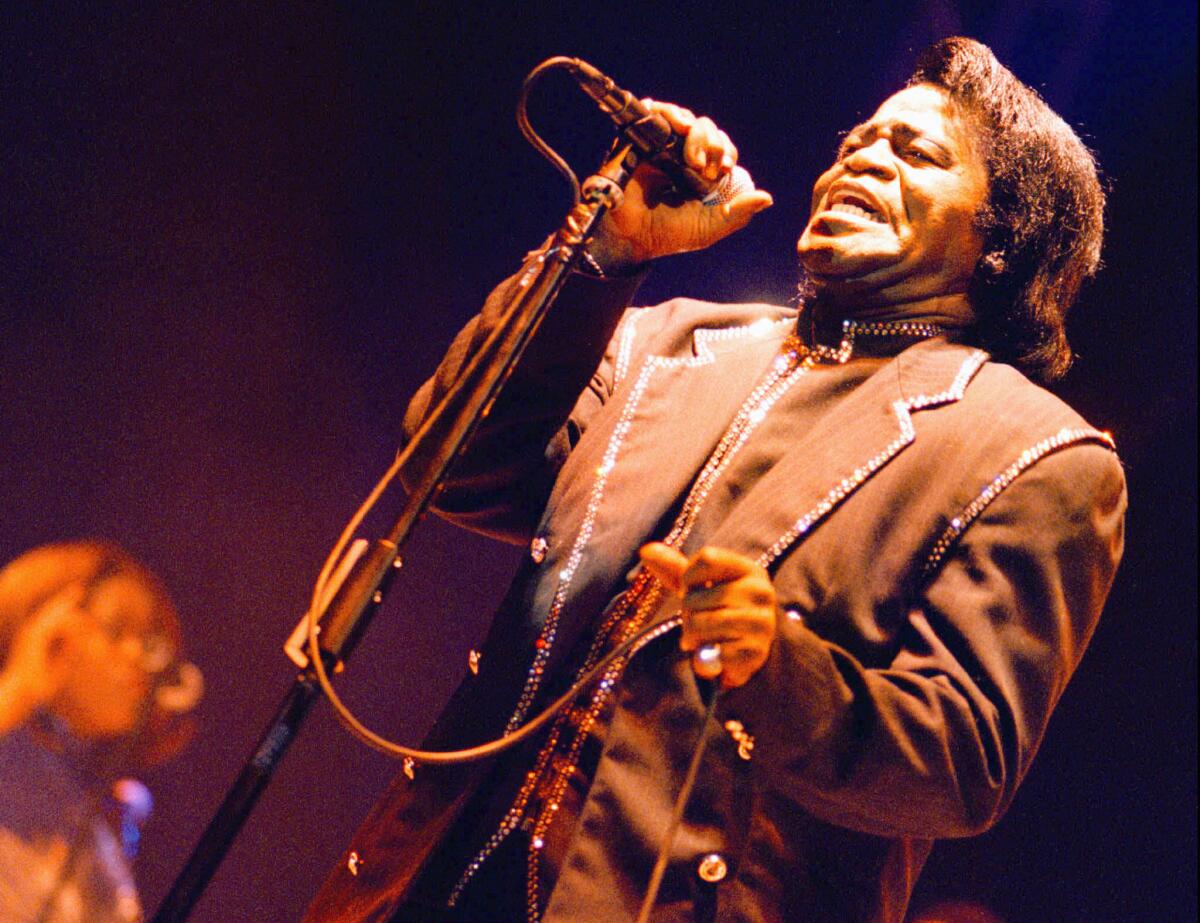Review: HBO’s ‘Mr. Dynamite’ focuses on James Brown, the performer

Star time, ladies and gentlemen, arrives Monday on HBO with the premiere of “Mr. Dynamite.” A documentary film on the life and times of James Brown as the times made the music and the music shaped the times, it is a long, soulful scream over an insistent funky vamp.
Like the recent big-screen Brown biopic “Get On Up,” it was co-produced by Mick Jagger, almost, one might say, as a corrective to the insult that even loving dramatizations can do to a real life. The most uncanny impersonation is, after all, a shadow of someone else’s irreplaceable brilliance — a brilliance that is all over “Mr. Dynamite,” from downbeat to fade out.
Indeed, the film, filled with music from end to end, fades out long before Brown himself did, leaving his late-life misadventures (drug addiction, jail time) to other films and filmmakers. “Mr. Dynamite” spares us images of the artist contracting into a fraction — if a tireless and sometimes still thrilling fraction — of his former self, less world-beating than world-beaten.
Though neither naive nor mum about its subject’s destructive complications and contradictions, his brutal youth and abuse of women, Alex Gibney’s film concentrates on Brown the performer — both as a musician and as a public political personage, the voice of black pride (say it loud!) and economic self-sufficiency. He was not merely Mr. Dynamite, not just the Godfather of Soul (and of funk), but — most important to Brown’s own self-conception — the Hardest Working Man in Show Business, with equal stress on every word in that title.
Many telling tales are told here by his sidemen, associates and Brown scholars, alongside elegant, eloquent musicological analysis. Talking for the camera are bandleader Bobby Byrd (the “get on up” voice in “Sex Machine”); drummers Clyde Stubblefield, John “Jabo” Starks and Melvin Parker; backup singer Martha High, doing a fine impression of her former boss; saxophonists Maceo Parker and Alfred “Pee Wee” Ellis; trombone player Fred Wesley; and bassist Bootsy Collins, later of Parliament-Funkadelic and Bootsy’s Rubber Band.
Theirs are voices of admiration, frustration, bemusement, amusement, gratitude, love and a kind of loving disgust. He made stars of his sidemen, even as he couldn’t completely credit their contributions to the creation of his sound; he demanded strict discipline and decorum from the band, famously fining them for perceived mistakes, even as he sometimes forgot to pay them.
“He never saw himself as a hit artist; he always saw himself as a historic figure,” says the Rev. Al Sharpton, who met Brown as a teenager (and fan) and thereafter considered him a kind of surrogate father. Sharpton guesses that Brown was “off to himself in his own way musically, ‘cause he grew up in the world by himself,” giving him “the sense of me against the world. What was his negative may have ended up being his strength.”
Twitter: @LATimesTVLloyd
---------------------------------
‘Mr. Dynamite: The Rise of James Brown’
Where: HBO
When: 9 p.m. Monday
Rating: TV-PG (may be unsuitable for young children)
More to Read
The complete guide to home viewing
Get Screen Gab for everything about the TV shows and streaming movies everyone’s talking about.
You may occasionally receive promotional content from the Los Angeles Times.






